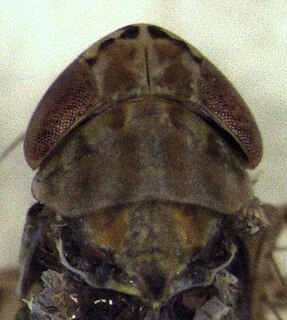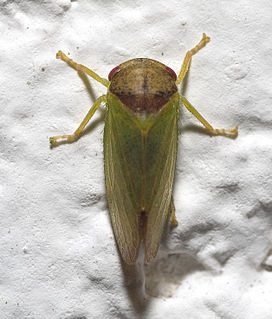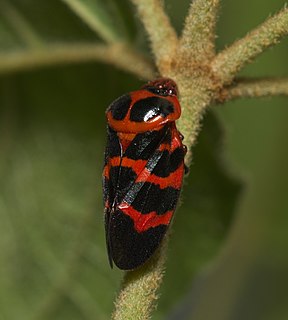Telingana is a genus of membracid tree hoppers found in Asia. They lay solitary eggs and the young do not aggregate as in some membracids. The genus was described by William Lucas Distant in 1908. Several species have been described in the genus including:
Krisna is a genus of leafhoppers in the family Cicadellidae. There are more than 30 described species in Krisna.

Pyrops is a genus of planthoppers that occur primarily in southeast Asia, containing about 70 species. They are fairly large insects, with much of the length due to an elongated, upcurving, snout-like projection of the head. The wings are generally brightly patterned in contrasting colors, and they are popular among collectors.

Maiestas is a genus of insects in the family Cicadellidae, the vast majority of which were formerly placed in the genus Recilia.

Cercopidae are the largest family of Cercopoidea, a xylem-feeding insect group, commonly called froghoppers or spittlebugs. They belong to the hemipteran suborder Auchenorrhyncha.

Deltocephalinae is a subfamily of leafhoppers. Deltocephalinae is the largest subfamily in the family Cicadellidae and is divided into 40 tribes, comprising over 925 genera, and over 6,700 described species.

Opsiini is a tribe of leafhoppers in the subfamily Deltocephalinae. The tribe contains 36 genera and over 300 species divided into four subtribes: Achaeticina, Circuliferina, Eremophlepsiina, and Opsiina.
Onega is a genus of leafhoppers in the family Cicadellidae.

Penthimia is a genus of leafhoppers belonging to the family Cicadellidae subfamily Deltocephalinae.

Ledrinae is a relatively small subfamily within the very large and diverse leafhopper family Cicadellidae. Originally placed in its own family, the "Ledridae", it is based on the type genus Ledra.

The Blissidae are a family in the Hemiptera, comprising nearly 50 genera and 400 species. The group has often been treated as a subfamily of the Lygaeidae but was resurrected as a full family by Thomas Henry (1997).

Cicadellini is a tribe of leafhoppers in the family Cicadellidae. There are over 300 genera and several thousand described species in Cicadellini.

Exitianus is a genus of leafhoppers in the family Cicadellidae. There are more than 50 described species in Exitianus.

Iassinae is a subfamily of leafhoppers in the family Cicadellidae.

Evacanthinae is a subfamily in the family Cicadellidae (leafhoppers).

Hemisphaerius is a genus of bugs in the family Issidae and tribe Hemisphaeriini. Species resemble the closely related Gergithus: but are differentiated in this genus by the size of the frons and shorter legs.

Chandrashekaraswami Adiveyya Viraktamath is an Indian entomologist who specializes in the systematics of leaf-hoppers, Cicadellidae. He served as a professor of entomology at the University of Agricultural Sciences, Bangalore.
Drabescini is a tribe of leafhoppers in the subfamily Deltocephalinae. There are currently 38 genera and almost 200 species in Drabescini divided into two subtribes: Drabescina and Paraboloponina.
Centrotypus is a genus of true bugs belonging to the family Membracidae.

Cosmoscarta is a genus of froghoppers found in the Indo-Malayan region. Many of the species are boldly marked in black and red or yellow. A few species are of economic importance as they can cause injury to plants under cultivation.















